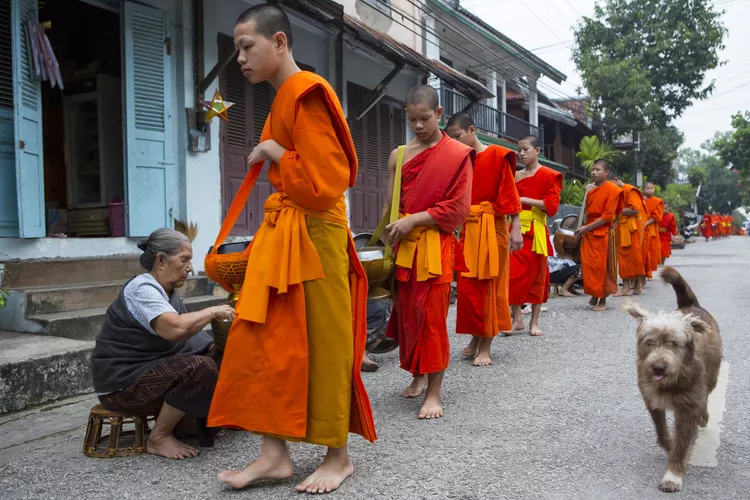Overview of the Tak Bat Ritual
The tak bat, or the collection of food by Lao monks in the morning, has become a must-see for travelers visiting Luang Prabang, Laos. However, the increasing popularity of this serene ritual among tourists raises concerns about its preservation.
The practice of offering food to monks is most vivid in Theravada Buddhist countries such as Laos and Thailand. This longstanding tradition plays a crucial role in sustaining extensive monastic communities.
In Luang Prabang, this sacred practice takes place each morning with monks silently lining the streets while locals and visitors bestow gifts of food into their bowls.
A Venerable Tradition in Luang Prabang
One of the most captivating sights in Laos occurs from 5:30 AM onward. Rows of saffron-clad monks walk through the streets of Luang Prabang, collecting alms in their bowls. Local inhabitants eagerly prepare bowls filled with the Lao staple, sticky rice, to offer to the monks.
With nearly eighty temples in Luang Prabang, the procession of monks takes various routes based on their temple’s location, providing plenty of opportunities for encounters and experiences. The routes through Th Sakkarin and Th Kamal are particularly popular among tourists, although the ritual unfolds throughout the entire city.
Each monk carries a large, covered bowl attached to a strap over their shoulder. As they pass the line of almsgivers, who usually sit or kneel on the ground, their bowls are filled with handfuls of sticky rice or bananas with great reverence.
Silent Ritual Bonds Both Giver and Receiver
Almsgivers take pride in preparing the essential ingredients for the tak bat ceremony. Locals rise early to cook the sticky rice, offering generous scoops to each monk’s bowl as the line progresses.
This ritual is performed in silence, with both monks and almsgivers refraining from speaking. As the monks walk in meditation, almsgivers demonstrate their respect by preserving the monks’ tranquil state.
For centuries, this practice has reinforced the symbiotic relationship between the monks who rely on food for sustenance and the almsgivers who seek spiritual merit through their generosity.
Dos and Don’ts of Participating in the Tak Bat
However, the influx of tourists in Luang Prabang has caused tension regarding the tak bat ceremony. Many visitors perceive it as a cultural spectacle rather than a profound religious event, which disrupts the ritual’s sanctity.
Tourists often encroach upon the monks’ space, interrupting their meditation with flash photography and loud behavior, which deters locals from participating. Consequently, some officials are contemplating actions to limit this growing trend, as it profoundly offends local customs and beliefs.
Tourists are welcome to observe and even take part in the ceremony, provided they do so with respect and the right intentions. Here are essential guidelines to follow:
- Don’t treat the ritual as a photo-op: Approach with genuine humility. If you cannot do this, maintain a respectful distance and do not obstruct the participants. If you can’t even do that, it is best to refrain from attending.
- Keep a respectful distance: Stay clear of both the monks and almsgivers.
- Dress modestly: Ensure your shoulders, torso, and legs are covered. This is especially important if you plan to actively partake in almsgiving. Remove your shoes if offering food.
- Do not use your camera flash: It disrupts the monks’ focus and diminishes the solemnity of the ceremony.
- Pay attention: Avoid positioning yourself so that your head is above that of the monks.
For those participating in the tak bat ceremony, specific recommendations include:
- Avoid purchasing food from nearby street vendors; either prepare the rice yourself or ask your hotel to provide some.
- Steer clear of making eye contact with the monks.
- Do not touch the monks. Withdraw your hands immediately after placing an offering in their bowls.
- Bow to the monks to show your respect.




